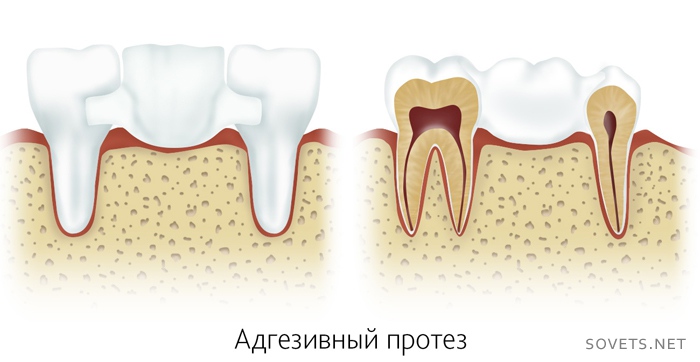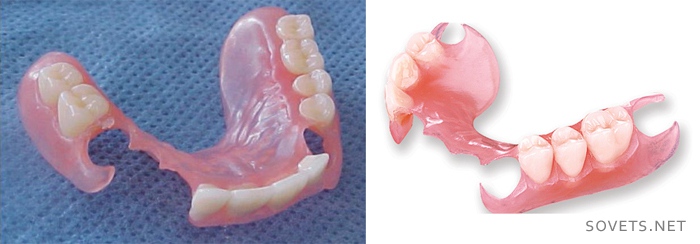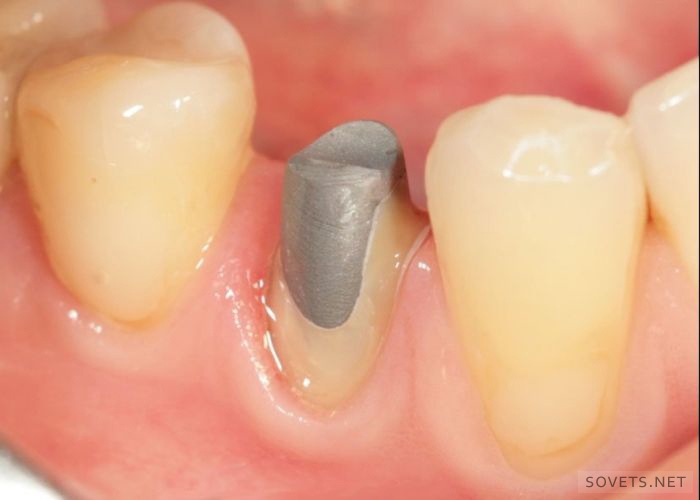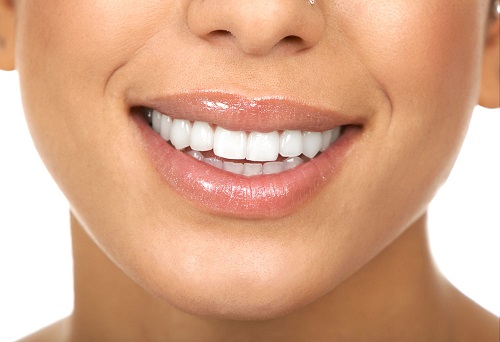Content
- Methods of prosthetics without turning teeth
- Dental prosthetics
- Benefits of Flexible Dentures
- Adhesive bridges or crowns?
- When the root is whole
- Dental implantation
- Features of prosthetics
With tooth loss, people try to choose a method for restoring the dentition, which excludes the involvement of neighboring teeth. If before, in order to restore one lost tooth, a bridge was necessary, but now dentists offer prosthetics without turning of adjacent teeth. This is a great way to bring back an attractive smile with little loss of healthy tooth tissue..
Methods of prosthetics without turning teeth
There are several ways to restore the dentition without involving supporting teeth. First of all, these are removable dentures. In addition to them, adhesive bridges, crowns are actively used, if the root of the tooth remains intact, and implantation is a more expensive way.
Each method has its pros and cons, as well as indications for use. It is impossible to say with confidence that implantation is suitable for the patient, even if he wants it. Only a dentist after a thorough examination and examination of the patient’s oral cavity will be able to conclude.
Dental prosthetics
In order for the design to last a long time, you need to properly prepare for prosthetics. An important stage is the rehabilitation of the oral cavity. It is also recommended to carry out hygienic brushing of teeth, especially if the coating is selected according to the color of the teeth.
Sometimes at the planning stage, the question of which teeth remain and which need to be removed is decided. It is also recommended to take an x-ray, in particular if implantation is planned.
The process itself consists of several stages:
- Preparation of the bed or place of attachment of the prosthesis
- Casting
- Design color matching
- Fitting design
- Construction fixation
Otherwise, the process directly depends on how the prosthetics will be performed..
Benefits of Flexible Dentures
One of the common and affordable ways to restore teeth without involving neighboring ones is to install a prosthesis. The removable construction is made of nylon. It is a surface that fits snugly to the gum with a tooth or teeth. Clamps also act as clamps: metal or plastic.
The advantages of this design are considered an affordable price and short manufacturing time. Cons – poor fixation with severe atrophy of the alveolar ridge and the fact that the prosthesis is removable. It is not excluded its unreliable fixation, deformation during movement by jaws.
Removable flexible prostheses are great as a temporary design to eliminate the defect. They do not rub due to the elasticity of the material, externally do not differ from their teeth and allow not to lose their attractiveness in those moments when a long process of prosthetics is planned (implantation).
Adhesive bridges or crowns?
Adhesive or adhesive bridges are a novelty offered by dentists. The design is a fiberglass beam connecting two tabs. An artificial tooth is attached to the fiber.

This is not to say that adjacent teeth are completely not involved. They make a small recess or groove for attaching the tab, but most of the tissue is preserved, unlike turning. The manufacturing process takes 2-3 days, and the cost of work does not greatly exceed the price of conventional ceramic crowns.
It is necessary to note one nuance that doctors attribute to both pluses and minuses. The minus is that the neighboring teeth are still involved, but if they have carious defects, then they are closed using the same tab. In other words, you not only restore the missing tooth, but also treat the neighboring.
When the root is whole
If the root system of the tooth is preserved, dentists recommend restoring it with crowns. To do this, the nerve is removed, and the channels are sealed. When the filling material hardens, a deepening of sufficient depth and diameter is made in it. Next, a cast is taken and sent to the laboratory. There, on the basis of it, a tab is made that will play the role of a pin that evenly distributes the load on the tooth root.
As soon as the pin tab is fixed, another impression is taken to make the crown. As a result, neighboring teeth are not involved at all, but the main condition will be the presence of a root. If it is highly durable, doctors can allow it to be supported and a bridge can be fixed to it..
Sometimes a situation is observed when the tooth becomes mobile. In this case, after restoration of the crown part by the above-described method, retainers or reinforcing tapes are fixed on the inside of the teeth. These tapes exclude excessive tooth mobility and allow it to gain a foothold. If you often smile or like to be photographed with a wide smile, this design will not be visible to others due to the use of a special method of attachment.
Dental implantation
The latest way to restore the dentition is implantation. It is an implantation of a pin made of a special alloy into the bone tissue of the jaw (see photo). Then, an abutment will be fixed on it, performing the role of a stump under the crown. A further method of prosthetics depends on the condition of the oral cavity and the patient’s desire. It can be removable dentures, crowns, bridges and so on..
Implantation has its own indications and contraindications. The former include the absence of one or more teeth. Doctors include contraindications for bone deficiency, poor bone condition, severe malocclusion, heart disease, hematopoiesis, and oncology. You also need to consider that the process is carried out under local anesthesia and takes a long time..
For a better understanding of the process of performing prosthetics without turning out adjacent teeth using implantation, you can watch the video. After this procedure, artificial teeth will look like real.
Features of prosthetics
An affordable way to restore teeth is a removable flexible prosthesis. The soft material does not injure the enamel, and externally the dentition looks attractive. Crowns and adhesive bridges come next in price. Implantation is considered a more expensive procedure..
Production time also depends on the complexity of the work. If a couple of days is needed on the adhesive bridge, then two-stage implantation lasts 6 months. In any case, in the absence of teeth, you need to contact the clinic and consult with dentists. Only after a thorough examination will they be able to tell which prosthetics method is best for you.
If you have already encountered prosthetics without turning of adjacent teeth, write about it in the comments. Leave your feedback what type of prosthetics you have chosen and whether you are satisfied with the result of the procedure.
Similar articles
- Ultrasonic toothbrush – pros and cons, contraindications. Which ultrasonic brush is better to buy, prices, video
- Dysport – what is this drug. What is better than Botox or Dysport injections and the effect on the photo before and after
- Atopic dermatitis in children – treatment with folk remedies and medications. Causes and symptoms of atopic dermatitis in a child, video and photo













